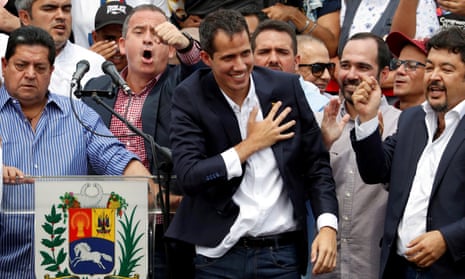The opposition figurehead battling to dislodge Venezuela’s president Nicolás Maduro has made an audacious homecoming, flying into the country’s main airport as he sought to re-energize his campaign for political change.
Juan Guaidó – who secretly left Venezuela last month to conduct a support-seeking tour of South America – landed at the Simón Bolívar international airport on Monday on a commercial flight from Panama.
Some had expected Guaidó – who left Venezuela in defiance of a travel ban imposed by Maduro’s government – to be arrested on arrival, despite warnings from the White House that there would be “strong and significant response” if that happened.
But the opposition politician, who most western nations now recognize as Venezuela’s legitimate interim president, successfully cleared immigration and was mobbed outside by reporters and fans.
“We are stronger than ever. We will carry on hitting the streets. We will carry on mobilizing,” Guaidó vowed, before heading to a rally in the capital, Caracas. “We know the risks we are facing but this has never stopped us.”
Crowds greeted him at the airport with chants of: “¡Sí se puede!’” (“Yes we can!”).
Supporters took to the streets of cities across Venezuela to celebrate their leader’s safe return from a five-nation tour of Argentina, Brazil, Colombia, Ecuador and Paraguay during which friendly regional governments rolled out the red carpet for Maduro’s challenger.
“This is a historic moment and I know that change is coming,” said Anger Guzmán, one of thousands of demonstrators who had gathered in Las Mercedes, an area of eastern Caracas that has witnessed a succession of recent anti-Maduro protests.
As news of Guaidó’s arrival was announced by opposition leaders, the 38-year-old added: “Having him here gives us more energy to carry on taking to the streets.”
The US national security adviser, John Bolton, tweeted: “President Guaido safely returned to Venezuela today to continue his strong push for a democratic future for the people of his country … His safety must be guaranteed. The world is watching.”
Harold Trinkunas, a Stanford University Latin America expert, said that by returning to Venezuela “through the front door” Guaidó had dared Hugo Chávez’s heir to detain him. “It challenges Maduro – and the fact that Maduro didn’t take up the challenge makes him appear weak.”
Trinkunas said Guaidó’s ability to enter the country undisturbed might also hint at fading support for Maduro within Venezuela’s security services.
“It’s very clear that the Maduro regime has been consistently on the defensive in recent weeks – which is an unusual position for the government to be in. Traditionally, Maduro and Chávez before him were quite good at wrong-footing the opposition. That seems to have turned around with the arrival of Juan Guaidó on the scene.”
But for all the opposition optimism, some believe Guaidó’s challenge to Maduro has floundered.
After the opposition leader declared himself Venezuela’s legitimate interim president on 23 January, and was backed by a succession of countries including the US and the UK, many opponents hoped Maduro heir would be gone within days.
Hundreds of thousands of anti-Maduro protesters flocked onto the streets to cheer what they believed was his imminent downfall.
But six weeks later, Maduro remains in power and, beyond widespread popular support, Guaidó enjoys little concrete power in Venezuela.
Temir Porras, Maduro’s former chief of staff, said he believed Guaidó and his backers in Washington and Latin America had anticipated a wave of military defections would cause a “quick collapse” of Maduro’s administration.
“But it is time to acknowledge that that didn’t happen – and there must be reasons for that.”
“Happily, the Venezuelan military are a united institution because … if we had fire power on both sides we would have the perfect cocktail for a disaster … everything could go wrong,” Porras said. “Imagine how dangerous it is to fracture a military institution and the risks of this thing becoming a total, catastrophic civil war.”
Porras argued that to avoid such a scenario, a negotiated settlement between Maduro’s Chavista movement and the opposition was now urgently needed.
Addressing a rally in Caracas on Monday afternoon, Guaidó urged supporters to continue fighting for political change and called fresh protests for next Saturday.
“The time is now. It is now that we must bring change to Venezuela. All of us together,” he said.
Borrowing a refrain often used by Maduro supporters, the crowd cheered back: “Guaidó, amigo! El pueblo está contigo!” “Guaidó, our friend! The people are with you!”
Gloriannys Pérez, a 19-year-old student who was among the demonstrators, said she was relieved and encouraged that her leader had returned.
“I thought they would arrest him … so it is so exciting to see him up on stage today because to me he symbolizes the hope of a nation and of the change that we are all hoping for.”
Pérez dismissed the suggestion that efforts to remove Maduro were running out of steam.
“I believe it is different this time, people feel hope and they are not prepared to give it up as has happened before,” she said.
Trinkunas said: “There was a fear that Guaidó was losing momentum by being overseas for a prolonged period of time.”
“Now he has an opportunity to restore momentum. But we have to see now what Maduro does next and also what the armed forces do next. They are still the cornerstone of the regime.”
